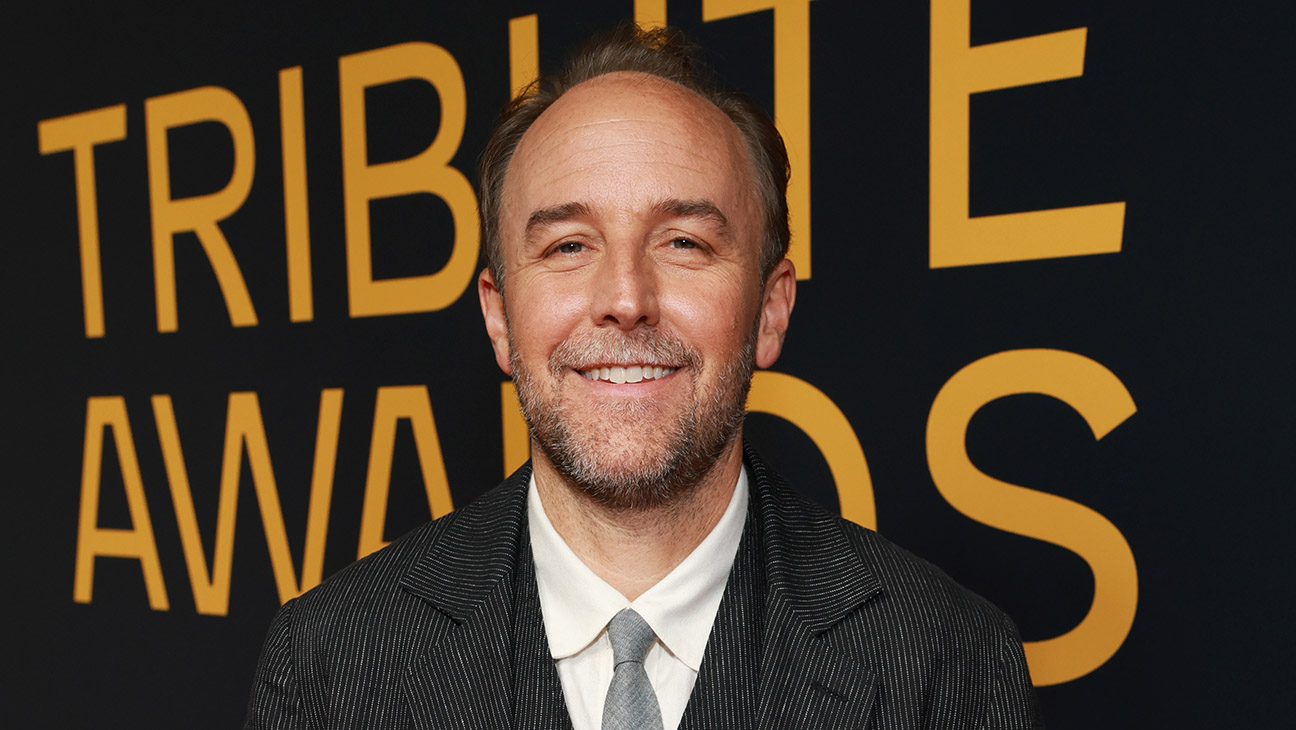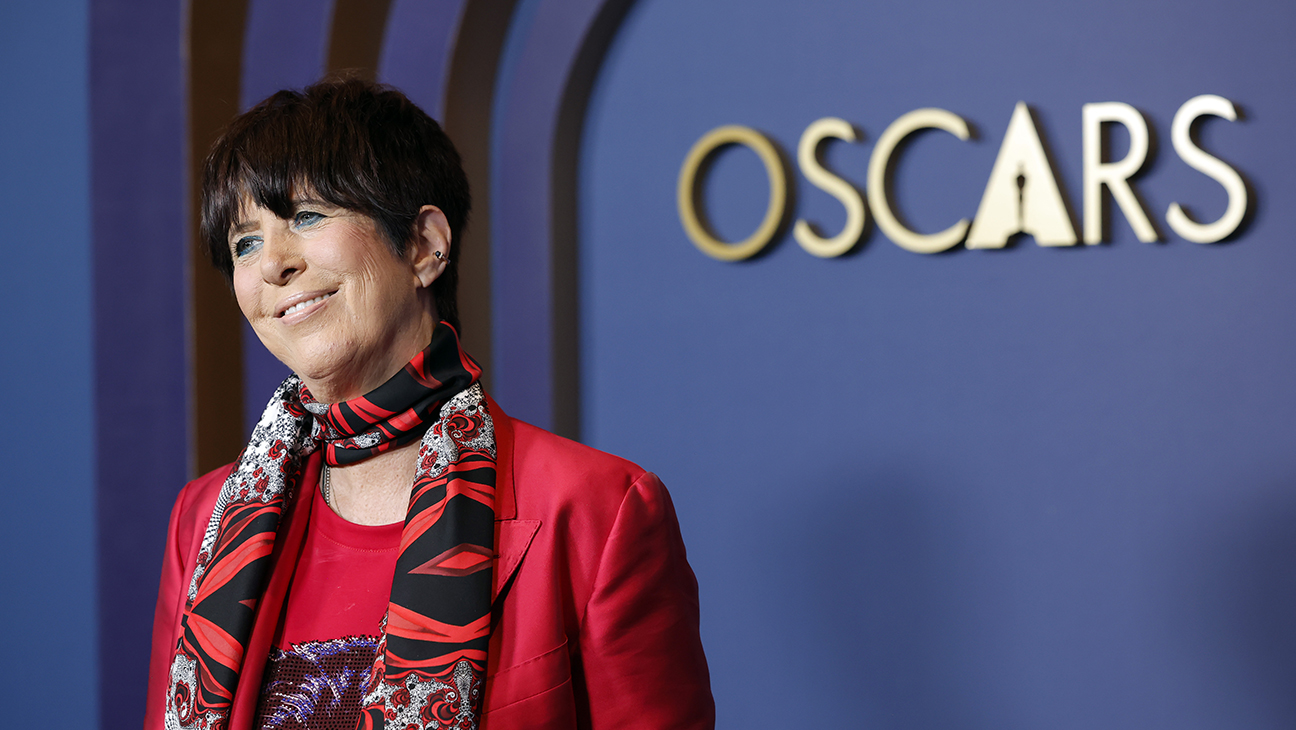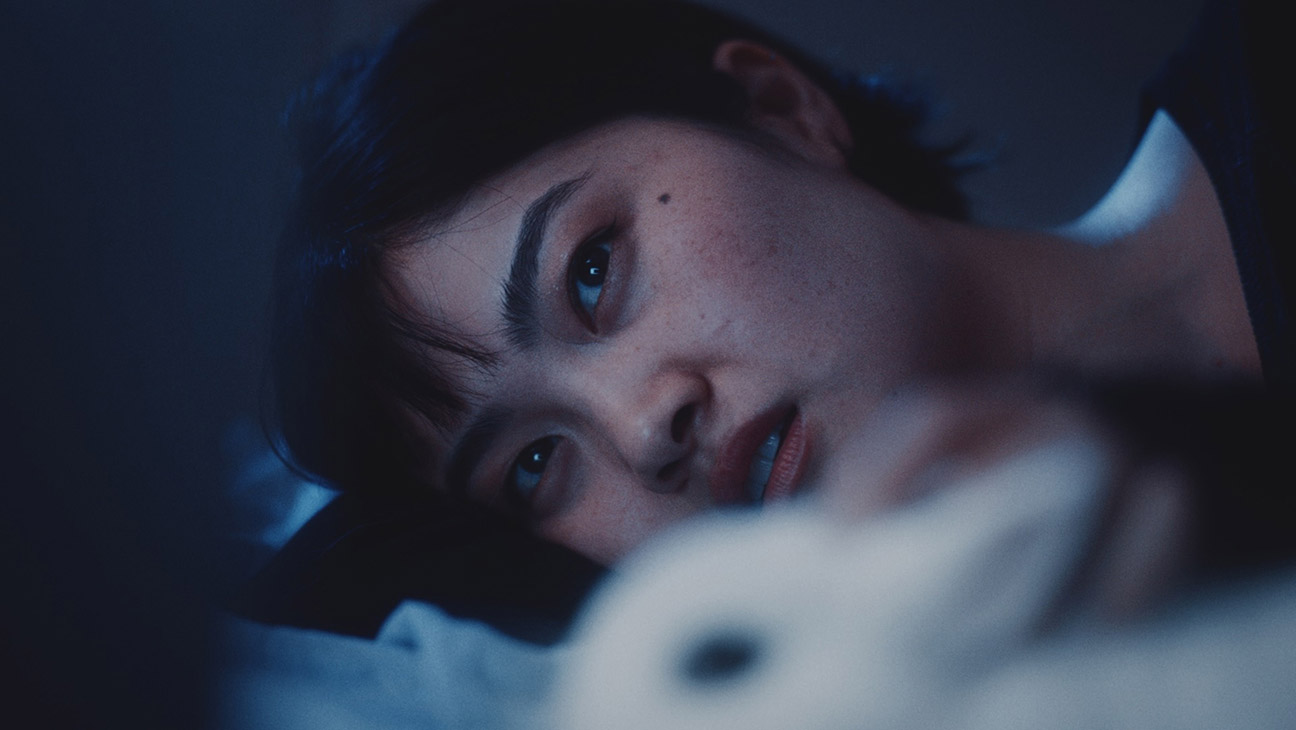[This story contains mild spoilers for the true story that serves as the basis for Roofman.]
For Derek Cianfrance fans, the interminable wait for his fifth feature film is finally over.
Roofman, which opens Oct. 10 in movie theaters nationwide, is the writer-director’s first film since 2016’s The Light Between Oceans. The Colorado native may have had a near-decade-long drought on the big screen, but he’s still been highly productive in the meantime. First and foremost, it was important to him to be present for his two kids during their adolescence. So when he wasn’t writing and developing narrative projects from home, he would butter his bread with commercials. His spots for Nike Golf, Powerade and Squarespace even landed him a 2017 DGA award for outstanding directorial achievement in commercials.
In 2020, Cianfrance returned to fictional storytelling after Mark Ruffalo tapped him years earlier to helm his HBO limited series, I Know This Much Is True. He wrote and directed all six episodes, so he still views the premium cable endeavor as a six-and-a-hour movie. Cianfrance and Ruffalo’s collaboration ultimately led to the latter winning an Emmy for his dual role. And what makes their success all the more interesting is that Ruffalo once turned down the role of Dean Pereira in Cianfrance’s breakout film, Blue Valentine (2010). But Ruffalo wasn’t alone in this regard.
Channing Tatum also declined the part that later went to Ryan Gosling, who starred opposite Michelle Williams’ Oscar-nominated turn. 17 years after Tatum passed, Cianfrance met him for a stroll around Brooklyn’s Prospect Park, but the two never discussed the fact that the filmmaker was already writing Roofman. From there, Cianfrance continued to write and rewrite the film with Kirt Gunn, but he was now doing so with Tatum in mind. In early 2024, Tatum received the tailor-made script and accepted the role of Jeffrey Manchester.
Manchester’s story is that of an Army Veteran who turned himself into a prolific armed robber in order to provide for his struggling family. He burglarized upwards of 60 McDonald’s restaurants by gaining access through the roof of each location, hence the nickname “Roofman,” but he did so in the most affable way possible. Eventually, his luck ran out in the early 2000s, and he received a lengthy prison stint. After studying the ins and outs of his penitentiary, Manchester finagled a way to escape through the prison’s loading dock, and needing a place to hideout until the heat died down, he found refuge in the walls of a Charlotte-area Toys “R” Us.
At a certain point during his six months on the lam in 2005, Manchester made his way out into the world, specifically a nearby church. That’s where he met a single mother named Leigh Wainscott, who is portrayed by Kirsten Dunst in Cianfrance’s film. Oddly enough, inside of his Toys “R” hideaway behind a false wall, the real Manchester slept on Spider-Man bedsheets and watched Dunst’s Spider-Man 2. The relationship between Manchester and Wainscott quickly progressed to the point where Jeff, as his alter ego John Zorn, reveled in being a surrogate father to Wainscott’s kids.
Non-biological parents happened to recur throughout most of Cianfrance’s work, and the first person who brought this pattern to his attention was none other than Ryan Coogler.
“I was talking to Ryan Coogler after he made [2013’s] Fruitvale Station, and I remember he said, ‘Yo, D. How come all the fathers in your movies raise kids that aren’t their own?’ And that’s when I realized how thoughtful Coogler is,” Cianfrance tells The Hollywood Reporter. “I was like, ‘I wasn’t even aware of that.’ It was something subconscious that played through my movies. There’s some personal reasons for it, and it continues to be something that I’m drawn to in my movies. But I’m reluctant to exactly give the specific reason why.”
Below, during a recent conversation with THR, Cianfrance also shares some of his conversations with the real Manchester and how they influenced his choices on the screen.
***
I enjoyed Roofman to the point where I got frustrated that it’s been nine years between films of yours. I actually made a very similar point to Jeff Nichols last year. Two of the most celebrated American filmmakers should be able to release films every few years like clockwork. Now, I know that you weren’t just looking out the window the entire time. You were plenty busy with your HBO show, commercials and development. But are you more zen about the nature of the film industry than I am?
Well, it’s hard to make movies. It’s always been hard, but the struggle of making movies is a good thing. It makes movies better. Pressure makes diamonds. In those nine years, as you alluded to, I did make I Know This Much Is True, which, to me, was a six-and-a-half hour movie that went on TV.
I also have kids, and while they’re almost out of the house now, I’ve spent a lot of the last two decades really focusing on being a dad. When I go off to make a movie, it’s so full-on that it takes me away from those moments of being a father and being present. So, if I’m honest with you, I’ve spent a lot of these last 20 years figuring out every way I could to not make movies and just stay home to write. I would get up at 5:30 in the morning to start writing at the kitchen table, and when my kids would wake up, I’d make them breakfast before returning to writing. I would always be present.
When you make a movie, you spend 40 days and 40 nights away or whatever it is. I Know This Much Is True was 116 days away, and so I’m always aware that there’s a cost to that. But now that my kids are older, I’m hoping that I can maybe become more prolific, and I know it’s going to be hard.
With filmmakers, there’s an inherent will. You have to have a lot of will to put something that doesn’t exist into the world and that no one is asking for. No one was asking for BlueValentine. No one was asking for Roofman to come into the world. I had to find it, push it and believe in it enough until it’s out there in the world. But then there’s this other aspect that’s counter to your will, which is the chaos of the universe. It doesn’t care about your will or what you want. It’s going to do what it decides, so I’ve always been conscious of that chaos of the world or the universe.
For instance, when I first started to write Blue Valentine in 1998, I was 24 years old. I didn’t have kids, I wasn’t married, and I felt cursed that I couldn’t get it made. It took 12 years to get that movie made [in 2010], but by the time I made it, I was married with two kids. So I understood the movie in a deeper way.
When I first wrote BlueValentine, my dream cast was Benicio del Toro and Ashley Judd. They would’ve been awesome, but I went through so many iterations of so many different actors. I then offered the role to Mark Ruffalo, and he said no. I also offered it to Channing Tatum, and he said no. But Ryan Gosling and Michelle Williams believed in me first before anyone. They were the first people to say yes. When I was on set shooting with them, I realized just how blessed I was that they were the ones that said yes. It had to be the two of them, and the universe was actually helping me.
So everything happens for a reason, and I try not to get too caught up in it. My job is to push to make things, but when there’s resistance, I always feel like there’s a reason for that and that the resistance is going to protect me.
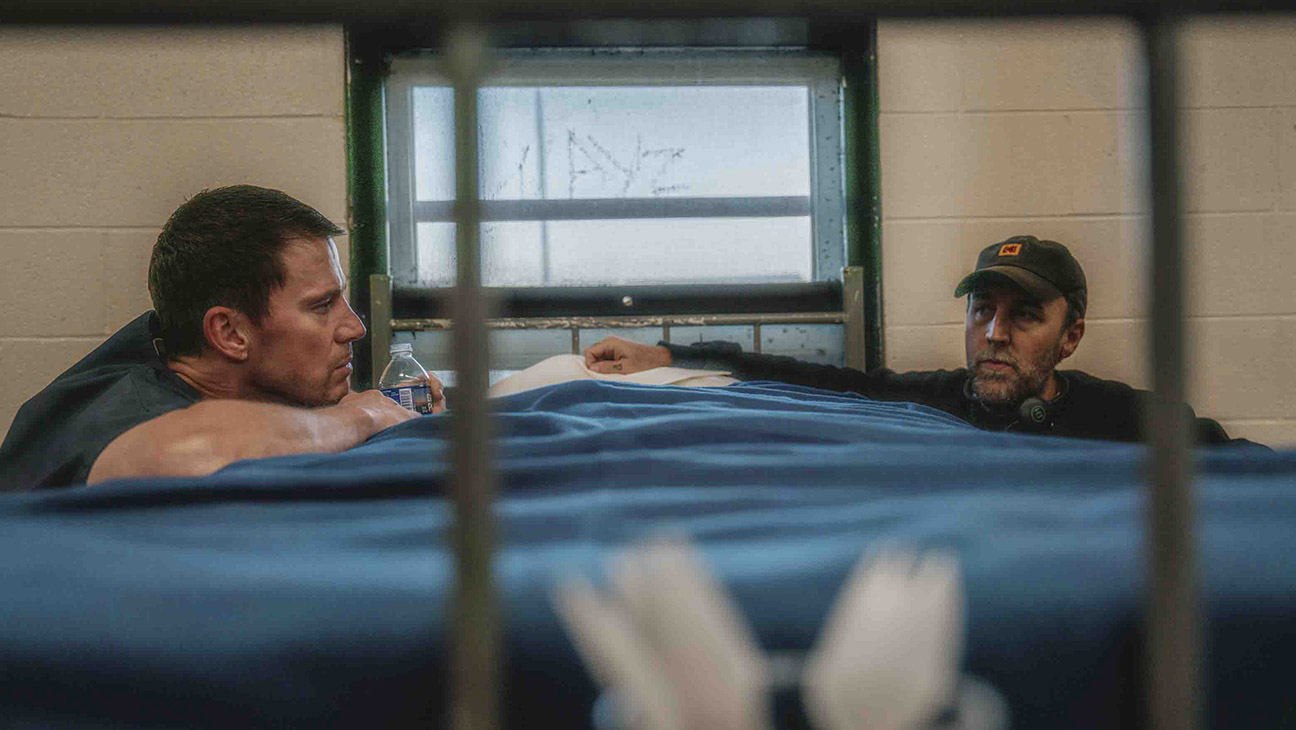
Tonally, Roofman is your most accessible film. It has plenty of your trademark drama, but it also seesaws between comedy and romance. Going forward, does Roofman mark a new beginning for you in terms of tone?
Oh, I definitely love the tone of Roofman. My wife [Shannon Plumb] is the comedian, and I’ve always been the tragedy. At the same time, she’s more serious in real life, and I’m more fun-loving in real life. I don’t know if she would agree with that. But I started to realize that comedy and tragedy are flip sides of the same coin. And with this movie, I thought I could flip the coin in the air so you would see comedy and tragedy both spinning at the same time. If you slip on a banana peel and you fall on your butt, it hurts, but people laugh. Pain and humor are so intertwined that I thought it would be an interesting, challenging place to live.
So I’ve definitely caught the bug for that, but I also love horror movies. Horror movies were part of my formative years: George Romero’s Creepshow and Night of the Living Dead, and Tobe Hooper’s The Texas Chain Saw Massacre. There’s so many horror movies that I love so much. So that’s definitely on my horizon too, and now that my children are older, I think I’ll start experimenting with more and more genres.
Before Roofman, you were tied to a very different kind of man, a Wolf Man, to be exact, and the idea of a Derek Cianfrance horror movie remains intriguing. So I’m glad that you still want to pursue that genre someday.
100 percent. Yes, it’s coming. Just wait. It wasn’t Wolf Man. Unfortunately, it just didn’t work out, but there’s definitely a horror movie brewing.
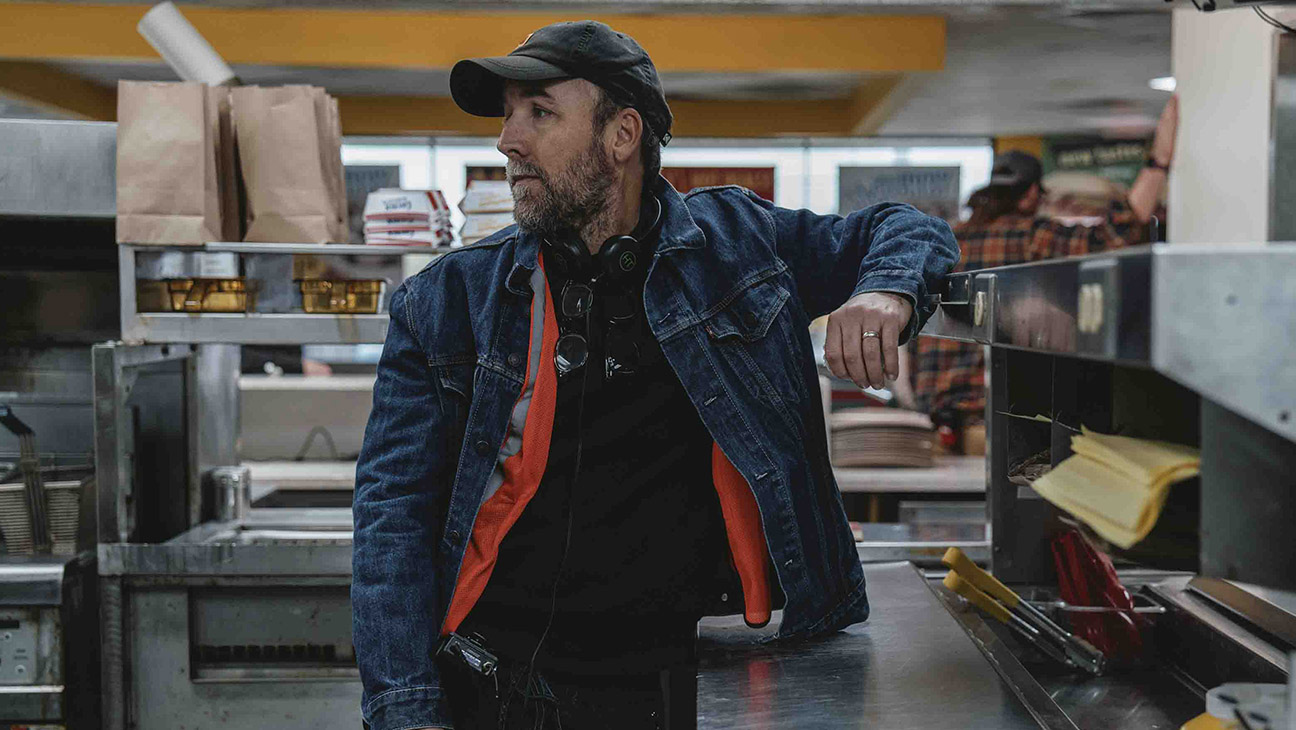
In Blue Valentine, The Place Beyond the Pines and The Light Between Oceans, you have parents raising other people’s children. Well, in Roofman, Jeff (Tatum) is also trying to serve that role with Leigh’s (Dunst) daughters since he can’t be there for his own kid. Why do you think you’re consistently drawn to non-biological parents?
And the last shot of I Know This Much Is True is similar. Mark Ruffalo and Kathryn Hahn are holding twins that aren’t their own. I never was aware of that [until after 2012’s The Place Beyond the Pines]. Ten-plus years ago, I was talking to Ryan Coogler after he made [2013’s] Fruitvale Station, and I remember he said, “Yo, D. How come all the fathers in your movies raise kids that aren’t their own?” And that’s when I realized how thoughtful Coogler is. I was like, “I wasn’t even aware of that.”
It was something subconscious that played through my movies, and I’ve since thought about it and looked into it. There’s some personal reasons for it, and it continues to be something that I’m drawn to in my movies. But I’m reluctant to exactly give the specific reason why. If you look at something under a microscope, you have to put some alcohol on it. It freezes it and kills it, and once you kill it, you can examine it. So I would rather not examine that right now and just let it keep living out there.
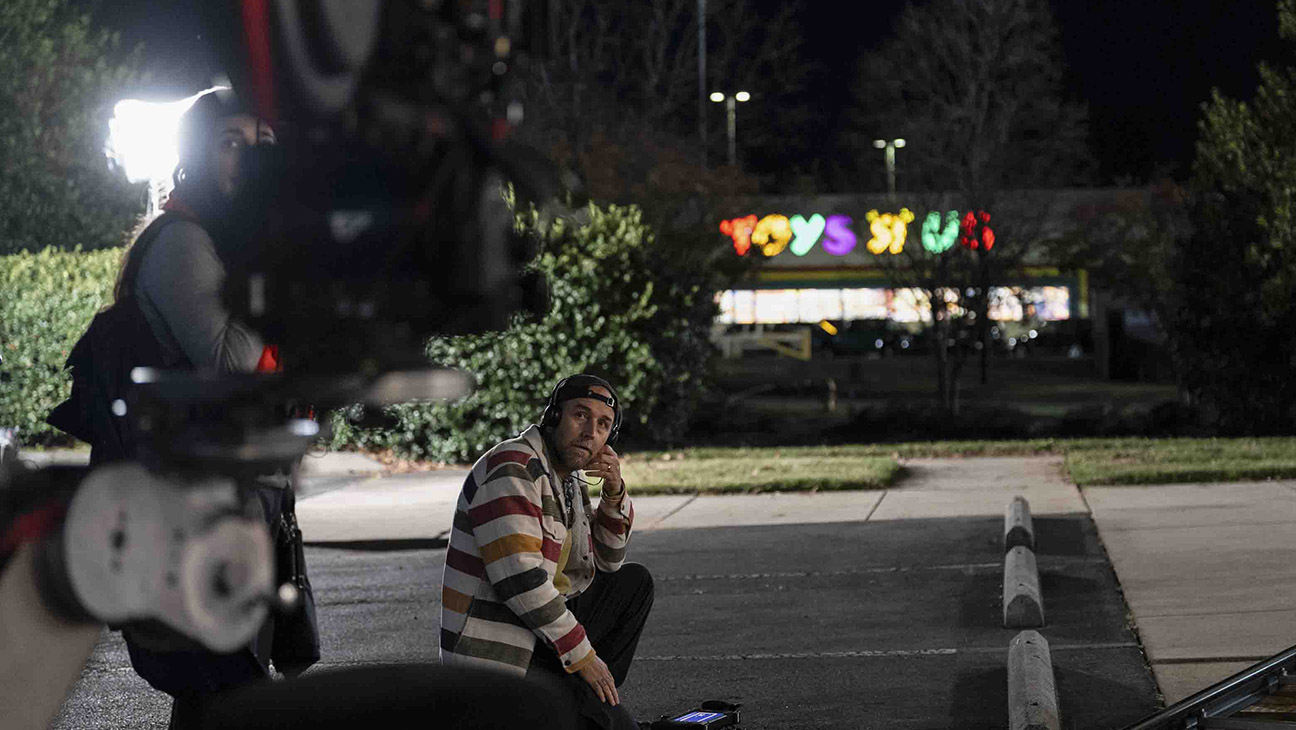
Your past films also tend to jump ahead in time to explore the long-term impact of your characters’ decisions. Did you ever consider an epilogue between Jeff and his grown-up daughter?
That story is still being told between Jeff and his grown-up daughter. After he left the Army, Jeff found himself trying to provide for his family, and he couldn’t do it. In the 1950s, if one person in a home had a job, it was pretty much guaranteed that you could have a house and a car. And if two people in the household worked, it was pretty much guaranteed that you could have a two-car garage with two cars and maybe you could even have a swimming pool. But nowadays, it’s just that much harder. Parents work multiple jobs and still have a hard time getting ahead. So I think Jeff found himself in there, and he made some really wild, crazy bad decisions to try to be a provider for his kids.
In talking to him over the years, I remember always asking him, “What about your kids?” And he would say, “Well, I thought if I could get to Venezuela, I could see them.” And I would say, “But how does going to Venezuela get you to see your kids?” And I realized that when you get sentenced to 45 years in prison, you have no more agency as a parent anymore. You can’t determine when and if you see your kids. It now becomes your children’s decision whether or not they want to come see you or talk to you. Or it’s the other parent’s decision of whether or not they can come see you. So Jeff had no more control over that, and because he’s still in prison, it’s now his children’s choice whether or not they see him.
It just didn’t seem to be a present-day story; that story is still being written. So I didn’t know what the end of that story is yet, and I couldn’t provide a coda to that. The coda that I could provide was the one that the real Leigh told me about, and that was when she came to visit him. There’s people who saw early cuts of the film and said, “You don’t need the end scene.”
Wow.
And I was like,”That’s the essence of the whole movie.” That was the reason why I made the movie. When I talked to Leigh, I had assumed that maybe she felt betrayed by Jeff or she was angry with him. But she talked about him as the great adventure of her life and that he was like this unicorn that entered her world. So she didn’t regret a thing, and she wasn’t a dumbbell. She wasn’t gullible. She was a strong mother who cared for her kids, and she still appreciated the person that she fell in love with.
So that last scene in the movie was written from the reality of what happened. The real Leigh did go visit Jeff about six months after he was arrested, and the dialogue is almost [exactly] what both Jeff and Leigh told me had happened. And there was a catharsis there. The real Leigh met the mistakes that Jeff had made, and she looked upon the pain that he had caused with an equal amount of forgiveness and grace. So that became the North Star for the movie.
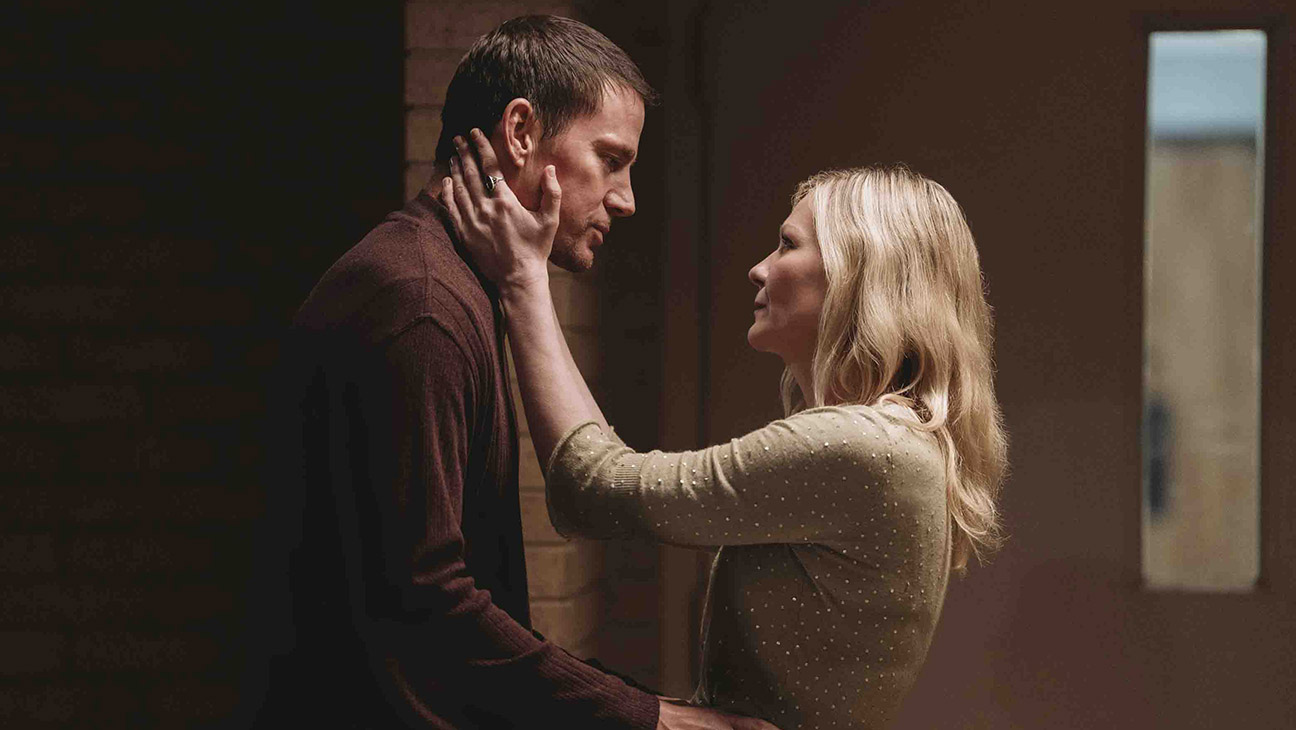
Strangely enough, the real Jeffrey Manchester watched the Kirsten Dunst film, Spider-Man 2, inside his makeshift living quarters. Did Kirsten ever acknowledge this trivia around you? And what did Jeff have to say about Kirsten playing Leigh?
I didn’t really talk to Kirsten about that, but when she first saw the movie, she called me afterwards. She was so moved and so warm, and she loved the movie so much. It was a relief to me because I have so much admiration for Kirsten as an actor. I’ve been a super fan of hers since forever. The Virgin Suicides, Interview with the Vampire, Bring It On, Spider-Man. So she was saying that it was so funny to her when she saw Jeff go to sleep in his Spider-Man bedsheets. She was like, “Here he was going to sleep in Spider-Man bedsheets, and I didn’t even realize until right now that I played Mary Jane. It’s so weird, but it’s great.”
The real Jeff did sleep in Spider-Man bedsheets. That was a detail that I took from his life. So when I told him that Kirsten Dunst was playing Leigh, I think he had a bit of infatuation as everyone has had with Kirsten Dunst at a certain point. She’s Mary Jane, and everyone watched her in awe, so Jeff couldn’t believe that it was her playing Leigh. Also, when I told him that Channing was playing him, he said, “Channing Tatum? You’ve got to find someone uglier.”
I read another amazing detail that the real-life case hinged on a DVD copy of Catch Me If You Can. When adapting true stories for the screen, I know you have to take artistic license, but was that element ever on the table?
Catch Me If You Can actually never made it into the script. But, yeah, when the cops discovered Jeff’s hideout, they also found a thumbprint on a DVD of Catch Me If You Can. Jeff is a huge movie buff. His favorite movie is actually George Armitage’s Miami Blues with Alec Baldwin and Jennifer Jason Leigh, and it’s a very interesting movie for Jeff Manchester to love. As he was living his life doing all these crazy things and making all these bad choices, my secret suspicion was that he was imagining himself as the protagonist in his own movie. That’s why he creates such a roller coaster ride when you watch him. He was living his life as if it was a movie.
By the way, when I was writing the script, many people were like, “Oh, have you seen Catch Me If You Can?” And I hadn’t seen it. So I made sure that I never saw it because I didn’t want to be influenced by that movie. But now that I’ve finished Roofman, I’m going to finally watch Catch Me If You Can.
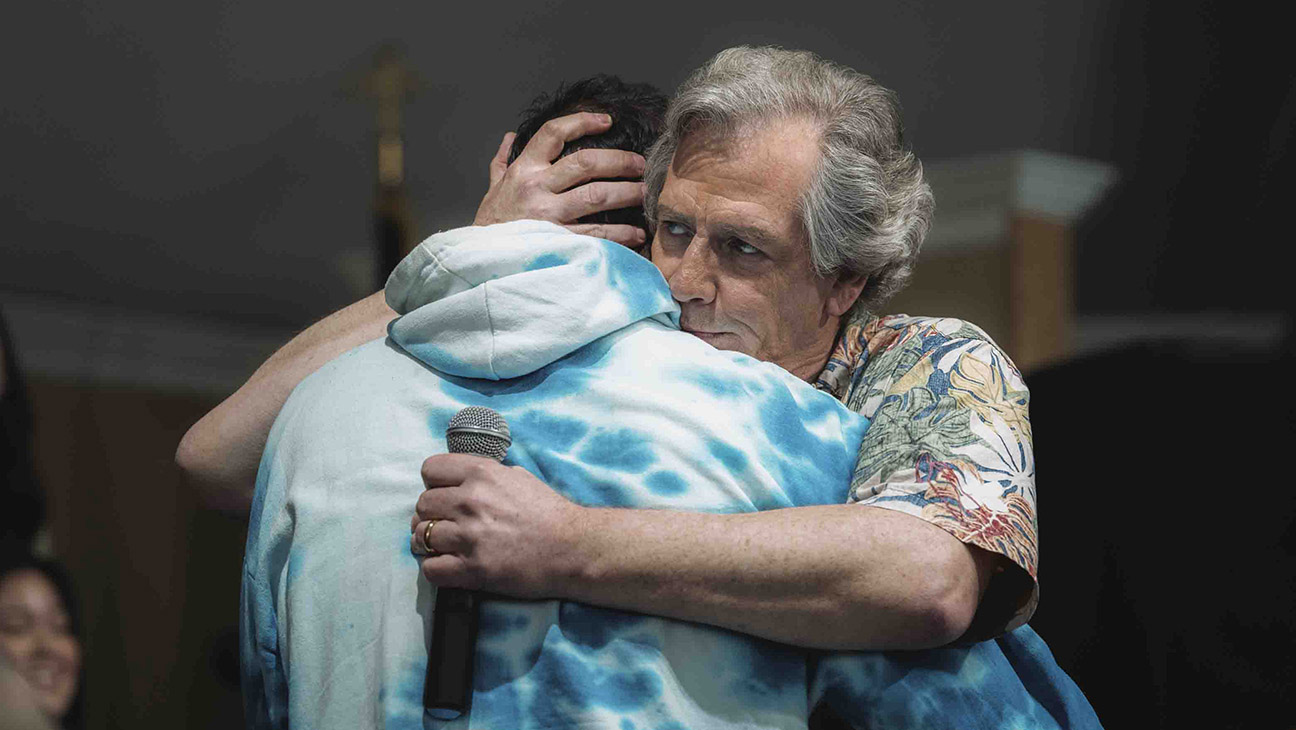
For a film that has a number of seedy characters, I can’t help but laugh about the fact that Ben Mendelsohn is playing a pastor/leader of a church choir.
(Laughs.)
Emory Cohen also plays the least confrontational character ever after playing the most confrontational character ever for you in Pines. Did Ben and Emory both have a laugh when you brought them roles that are so polar opposite from their last ones with you?
Mendelsohn and Emory are both the bravest actors. The reason they play such great villainous characters is because they’ll go there. They have no fear. They’ll push the boundaries. Ben will play the devil. He will go all the way there. But I know who Ben is, and I know who Emory is. I know their hearts, and I know how beautiful they are as human beings. I told Ben, “I don’t want to do that to you here.” When we were rehearsing the Randy Newman song, “I’ll Be Home,” that he sings, his first rehearsal had this very deep-voiced gravel. And I was like, “Ben, you have to sing falsetto. You have to move towards the light. No darkness. I do not want you to see the darkness. Find the light.” So that was my direction to him.
And with Emory, the character of Otis had no lines in the script. I actually went to see Jeff Nichols’ The Bikeriders, and when I saw Emory on that screen, I hadn’t seen him in so long. I was like, “Oh my God, he is my favorite actor.” So I called him up to meet with him, and I was like, “Man, I just want to work with you again.” And he was like, “Okay, well, I hear you’re making a movie.” And I was like, “But there’s no real role for you. I don’t know what to do. There’s a character named Otis, but he doesn’t really have any lines. He’s just kind of a background character. Do you want to take a look at it and see if you can build anything with him?” And Emory was like, “Sure, I’ll take a look.”
So he came back a week later, and he’d built this whole character study. He wrote the scene about the Peanut M&Ms. That was all Emory. Kirt Gunn and I didn’t write that. All of a sudden, I realized that Otis’ story is about this kid who is trying to find his courage. Emory has told me that he’ll sit outside cafes or restaurants, and a car load of guys will drive by him and say, “Is that your dad?” They’ll spit him lines from The Place Beyond the Pines. And I was like, “Man, I just want people to see you as you.” So, knowing that Ben and Emory have the courage to go towards the darkness, I was like, “Let’s go to the light together.” Those two are so beautiful.
My casting director, Bonnie Timmermann, is a living legend. The cast in this movie is like the aisle of misfit toys. Everyone is Rudolph. Everyone is absolutely one of a kind. I have always had an allergy towards “cool” people. I’ve always liked warm people. It’s one of the reasons why I like Jeff [Manchester]. He’s not cold and calculating; he’s warm and calculating. His humanity is his fatal flaw in terms of his success as a criminal. And all the people that are in this movie, they’re all such warm-hearted people. So I just wanted to steer them all to the light, except maybe Dinklage.
***
Roofman opens Oct. 10 in movie theaters.

